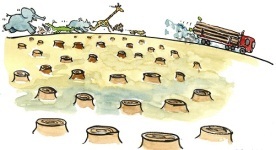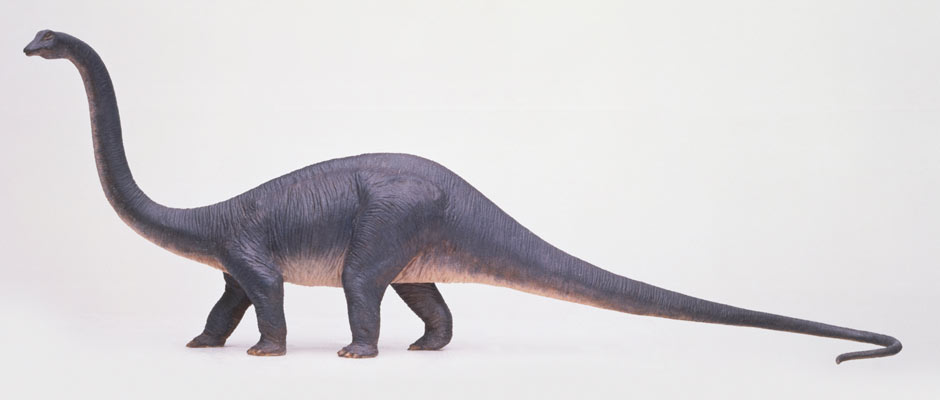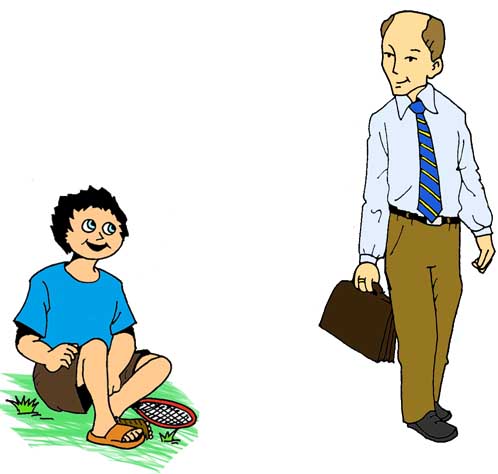10:All About Animals
25. Our Changing World我們不斷變化的世界
New Words新單詞
die out / died out
讀音:[dai aut] / [daid aut]
釋義:(指物種、家族、習慣、觀念等)絕跡,消失;絕種;絕滅;淘汰
number
讀音:[ˈnʌmbə(r)]
釋義:數量;號碼;數字;編號
dinosaur
讀音:[ˈdaɪnəsɔr)]
釋義:恐龍
needed (past tense of need)
讀音:['ni:dɪd]
釋義:需要,必須(need的過去式和過去分詞)
**********
We know there are thousands and thousands of different kinds of animals in the world. The number of different kinds of plants is even larger. There are millions and millions of different kinds of plants! However, the numbers of these different animals and plants do not stay the same. These numbers of animals and plants change during hundreds, thousands and millions of years.
我們知道世界上不同種類的動物成千上萬。不同種類植物的數量甚至更龐大。不同種類的植物成百上千萬!然而,這些不同動植物的數量並非保持不變。在過去的幾百、幾千以及幾百萬年中,這些動植物的數量一直在變。
There are many millions more people now than there were just one hundred years ago. However, there are not more plants and animals. There are not as many plants and animals now as there were before. This is because many kinds of plants and animals died out. Because of this, there are many kinds of plants and animals that we cannot see today. Those kinds of plants and animals died out many years ago. Why? Why did all those kinds of plants and animals die out?
現在的人口僅與一百年前相比就多了好幾百萬。然而,動植物的數量卻沒有增加。現在動植物的數量沒有以前多。這是因為很多種類的動植物都滅絕了。因此,很多種類的動植物我們今天都看不到。那些種類的動植物在很多年前就滅絕了。為什麼?為什麼那些種類的動植物都滅絕了?
First, let’s think about animals. There are three important ways in which animals die out. The places where animals live, like forests and seas, often change during hundreds, thousands or millions of years. Because so many more people came into the world, we needed to change many forests into farms so we could grow enough food to feed the world’s people. We also needed to cut down forests so people could make homes to live in. However, because of this, many animals did not have the places they needed to live in and hunt for food. Those animals had nowhere to go and nothing to feed on. This made those animals die out.
首先,我們來想想動物。動物滅絕的原因主要有三種。動物生存的環境,比如森林和海洋,往往經歷了千百年、幾百萬年的變化。因為有更多的人來到這個世界,我們需要把許多森林變成農場,這樣我們就可以種植足夠的糧食來養活世界人口。我們還需要砍伐森林來建造房子給人居住。但是,正因為如此,很多動物沒有生存和捕食所需的地方。那些動物沒有地方可去,沒有東西可吃。這導致那些動物滅絕。

A second way animals die out is when people hunt and kill them to feed themselves. People also hunt and kill animals to make clothes, medicines and other things. For thousands of years, people needed to hunt wild animals so the people could feed themselves. If they did not do this, the people themselves would die out.
動物滅絕的第二種原因是人類捕殺動物來養活自己。人類還捕殺動物來製造衣服、藥材和其他東西。幾千年來,人類需要捕殺野生動物來養活自己。如果人類不這樣做,他們自己就會滅絕。
Another way in which animals die out is because they cannot change in a way to let them live in a changing world. Our world is always changing. Sometimes, during hundreds, thousands or millions of years, temperatures in different parts of the world change. Places become hotter or colder. This change in temperature makes the plants in those places change, too. Some plants die out because they do not have the temperatures they need. Then animals that are not able to find the plants they need to feed on also die out.
動物滅絕的第三種原因是它們無法在一個不斷變化的世界上應變以生存。我們的世界一直在改變。有時候,在千百年或幾百萬年裡,世界不同地區的氣溫變化了。有些地方變得更熱或更冷。溫度的這種變化使這些地方的植物也發生了變化。有些植物因為沒有它們需要的溫度而死亡。有些動物找不到它們所需食用的植物,同樣也會死亡。
More than 200 million years ago, nearly all living things in seas all over the world died out. During this time, nearly half of all the other animals in the world also died out. This was because of very large changes in the world’s temperature during that time.
2億年多前,全世界海洋中的所有生物幾乎都滅絕了。在這段時間裡,世界上幾乎半數的所有其他動物也滅絕了。這是因為當時世界氣溫變化非常巨大。
Most people know about the dinosaurs. Some of the dinosaurs were very, very large animals. The biggest dinosaurs could be twelve meters long! That is really big! However, not all dinosaurs were large. The smallest dinosaur was only about half the size of the chickens we see today.
大多數人都知道恐龍。有些恐龍是非常、非常大型的動物。最大的恐龍可以長達十二米!那真的很大!但是不是所有恐龍都很大。最小的恐龍大約只有我們今天看到的雞的一半大小。

The dinosaurs lived until around seventy million years ago. Then, around that time, all the dinosaurs died out. Now there is nowhere in the world where we can find dinosaurs.
恐龍生活在大約七千萬年前。此後,大約在那段時間,所有恐龍都滅絕了。現在世界上沒有任何地方我們能找到恐龍。
What killed all the dinosaurs? Why did they all die out? Nobody really knows. It was not because of people. There were no people during the time of the dinosaurs. Maybe it was because of changes in temperature. Maybe they were not able to find enough of the plants or other animals they needed to feed on. Maybe it was because of something else, but at the same time as all the dinosaurs died out, so did nearly half of all the other animals in the world.
是什麼讓所有恐龍滅亡?為什麼它們都滅絕了?沒有人真正知道。不是因為人類。在恐龍生活的年代沒有人類存在。也許是因為氣溫變化。也許它們找不到所需要的足夠的植物或其他動物來養活自己。也許是因為其他原因,不過在所有恐龍滅絕的同一時期,世界上幾乎一半的所有其他動物也滅絕了。
These days, especially in the last one hundred years, most plants and animals are dying out because of people. Plants and animals are dying out much more quickly than before. This is not only dangerous for animals; it is also dangerous for people.
現如今,尤其是在過去的一百年中,大多數動植物因為人類而瀕臨滅絕。動植物滅絕的速度比比以前快得多。這不僅對動物很危險,而且對人類也有危險。
We need lots of different kinds of plants and animals to produce our food and medicines. Even the smallest animals and the smallest plants are important for our lives. Without enough plants and animals, we could not live. Because of this, we should be careful to protect animals and plants so that their numbers all over the world do not get too small.
我們需要許多不同種類的動植物來生產糧食和藥材。即使最小的動植物也對我們的生活很重要。沒有足夠的動植物,我們人類就無法生存。因此,我們應當小心保護動植物,這樣它們在世界各地的數量不會變得太少。
**********
Lee and his father are talking about the changing world.
李和他爸爸正在談論不斷變化的世界

Lee
Dad, we learned about dinosaurs at school today. Do you know about the dinosaurs?
Dad
The dinosaurs? What about the dinosaurs?
Lee
Do you know why the dinosaurs all died out?
Dad
No, I don’t. Do you?
Lee
No, I don’t, but something killed them. Our teacher said that it could be because of a change in the world’s temperature that started millions of years ago.
Dad
How would that kill them?
Lee
Our teacher told us that changes in the temperature make plants change. Some plants die out, and other plants change to become new plants.
Dad
So?
Lee
So some animals would not be able to find the plants they need to feed on, and other animals would not be able to feed on the different kind of plants that started to grow.
Dad
I see. So those animals died out.
Lee
Or maybe there would just not be enough plants for the dinosaurs to feed on. Lots of the dinosaurs were really big so they needed to be able to find lots of food to eat.
Dad
I think most of the dinosaurs were not so big. The big ones are just the ones people always think of. What else did you learn today?
Lee
We learned when it was that all those different animals and plants died out.
Dad
So when was it? When did all those plants and animals die out?
Lee
Well, it wasn’t just one time. During millions of years, really large numbers of animals died out five, six or more times.
Dad
Really? That’s interesting. When was the last time?
Lee
The last time really large numbers of animals died out was at the time of the dinosaurs.
Dad
How long ago was that?
Lee
That was about seventy or eighty million years ago.
Dad
Oh, that was a long time ago, wasn’t it?
Lee
Yes, but large numbers of plants and animals also died out millions of years before the time of the dinosaurs.
Dad
What about people? Why didn’t people die out at the same time. People like us are still here. Why didn’t people die out, too?
Lee
Dad! There were no people at the time of the dinosaurs. There were no people before the time of the dinosaurs. Didn’t you know that?
Dad
Of course I did. I just wanted to see if you know it, too.
Lee
Well, I do. There’s something else we learned today. In our time, lots of plants and animals are dying out again!
Dad
Why are so many plants and animals dying out now? Are temperatures changing again?
Lee
Many people think they are. But most plants and animals are dying out now because of people.
Dad
How is that?
Lee
Because people are changing the places where plants and animals live and grow. People often need those places to make houses and farms. If the plants and animals have nowhere to live and grow, they will die out.
Dad
Oh, that’s not so good, is it?
Lee
No, it isn’t. It’s very bad. It’s bad for the plants and animals, but it’s also bad for us. We need to have large numbers of plants and animals to produce all the food, medicines and other things we need.
Dad
So do you think we should protect the lives of plants and animals so we can protect our own lives and the lives of all the children who will come after us?
Lee
Yes, I do. If we don’t, people will be just like the dinosaurs. People will die out just like the dinosaurs did!
李
爸爸,我們今天在學校學習了關於恐龍的知識。您知道關於恐龍的知識嗎?
爸爸
恐龍?關於恐龍的什麼?
李
您知道恐龍為什麼滅絕嗎?
爸爸
不,我不知道。你知道嗎?
李
不,我不知道,但是有些事物讓它們滅亡了。我們老師說,可能是因為幾百萬年前開始的世界氣溫變化。
爸爸
那怎麼會讓它們滅亡呢?
李
我們老師告訴我們說,氣溫變化導致植物發生改變。有些植物滅絕,有些植物變異成新的植物。
爸爸
所以呢?
李
所以有些動物找不到它們需要吃的植物,有些動物不能食用開始長出來的不同種類的植物。
爸爸
我明白了。因此那些動物滅絕了。
李
或者可能只是沒有足夠的植物供恐龍食用。很多恐龍真的很大,它們需要能夠找到很多吃的食物。
爸爸
我認為大多數恐龍沒有那麼大。大恐龍往往只是人們的想象而已。你今天還學了什麼?
李
我們學習了所有那些動植物滅絕的時期。
爸爸
是什麼時期?那些動植物都是什麼時期滅絕的?
李
好吧,它們並不是一次性滅絕的。在幾百萬年中,大量動物滅絕了五、六次或更多次。
爸爸
真的嗎?那有意思。最後一次是什麼時候?
李
大量動物最後一次滅絕是恐龍生活的時代。
爸爸
那是多少年前?
李
大約是七、八千萬年前。
爸爸
哦,年代很久遠了,是嗎?
李
是的,不過在恐龍生活的年代以前,還有大量動植物也滅絕了。
爸爸
人類呢?為什麼人類沒有在同一時期滅亡呢?像我們這樣的人還在這兒活著。為什麼人類沒有也跟著滅亡?
李
爸爸!在恐龍生活的年代沒有人類。在恐龍生活的年代之前也沒有人類。難道您不知道嗎?
爸爸
我當然知道。我只想知道你是不是也知道。
李
好吧,我知道。我們今天還學了一些其他知識。在我們這個時代,許多動植物又正在瀕臨滅絕!
爸爸
為什麼現在有這麼多的動植物滅絕?氣溫又在變化嗎?
李
很多人認為氣溫在變化。不過現在大多數動植物因為人類而瀕臨滅絕。
爸爸
怎麼會呢?
李
因為人類正在改變動植物生存和成長的環境。人類經常需要那些地方來建造房子和改造農場。如果動植物沒有地方生存和成長,它們就會滅絕。
爸
哦,那可不妙,是嗎?
李
是的,不妙。那很糟糕。那對動植物有害,對我們人類也有害。我們需要大量動植物來生產我們需要的所有糧食、藥材和其他事物。
爸爸
所以你認為我們應當保護動植物的生存,這樣我們就能保護我們自己的生存和我們子孫後代的生存?
李
是的,我是這樣認為的。如果我們不這樣做,人類就會像恐龍那樣,人類就會像恐龍那樣滅亡!
**********
Questions
1. How many different kinds of plants are there?
2. How large were the biggest dinosaurs?
3. What happened more than 200 million years ago?
4. What is one way in which large numbers of plants and animals die out?
5. When did the dinosaurs die out?
6. Why are so many plants and animals dying out now?
7. Why are plants and animals so important for people?
**********